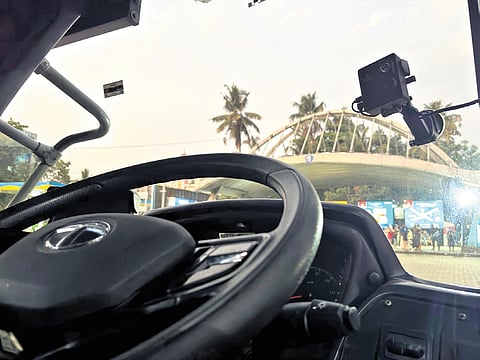

KOCHI: Exhausted drivers dozing off at the wheel is a major contributor to road accidents, with studies – that of the Central Road Research Institute (CRRI), for instance – attributing 40% of highway accidents to sleep fatigue. Now, the Kerala State Road Transport Corporation (KSRTC) has initiated a major step to prevent such mishaps by equipping its buses, especially those deployed for long-haul services, with driver fatigue detection sensor cameras.
The KSRTC has already installed the cameras in its new premium superfast AC buses and floated tenders to procure 5,000 additional dashboard cameras with the driver fatigue monitoring system.
“The artificial intelligence-enabled system will mainly be used to detect driver fatigue and distractions like the use of mobile phones while driving. The system uses cameras to monitor the driver’s eyes, head movements, and road conditions. It issues alerts if the driver is drowsy or inattentive. Smoking detection is another feature,” a senior KSRTC official told TNIE.
The sensor camera, being fitted along with the dashboard camera, will send instant alerts via beep sounds on detecting anomalies. A simultaneous alert will be sent to the Central Command Centre at the KSRTC headquarters in Thiruvananthapuram, thereby enabling real-time monitoring.
“We’ve installed the cameras in the new Premium Superfast AC buses on an experimental basis and found the system operating efficiently. The tender for 5,000 sensor cameras was floated a couple of days ago. The cameras will be installed first in long-haul and super class buses, and then the rest in phases,” the official said. According to the tender documents, the cameras should have a resolution of 1,280 x 720 pixels and should be shock and vibration resistant. The successful bidder has to ensure a real-time monitoring facility, provide a two-year comprehensive onsite warranty, and sign a three-year annual maintenance contract for the cameras installed in all KSRTC buses.
There have been several instances of bus drivers, particularly those on long-distance and night routes, experiencing fatigue, leading to drowsiness and, subsequently, accidents.
The KSRTC had earlier implemented a crew-change system in all long-distance night trips to reduce the number of fatigue-induced accidents. It also took steps to limit a driver’s maximum work hours in a crew-change system to eight hours. The drivers can take adequate rest between two duties. They are allowed to rest for 30 minutes after five hours of continuous driving.
Cameras in buses made mandatory from April 1
The transport department had set April 1 as the deadline for the installation of cameras inside stage carriers. But the driver fatigue detection system has not yet been made mandatory, as of now.
On February 8, the transport commissioner’s office mandated the installation of five cameras -- a front-facing camera, rear-facing camera, interior camera, driver fatigue detection sensor camera, and a camera facing the footsteps.
While a majority of stage carriage operators opposed the installation of the driver fatigue monitoring system, stating it as “unnecessary”, the KSRTC went ahead with the measure as an added safety measure.
“The buses need to install three cameras -- front-facing, rear-facing, and interior cameras for now. The driver fatigue detection system and footboard cameras can be installed within three months. The KSRTC and all private bus operators alike have been given the same time frame,” Transport Commissioner Nagaraju Chakilam said.